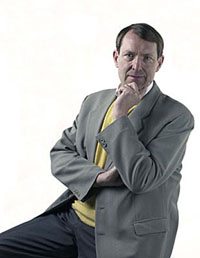Esko Seppänen (born 1946), Finnish MEP
6th Term of the Parliament 2004-2009:
-
Aligned with the Confederal Group of the European
United Left/Nordic Green Left and Member of the
Group's Bureau
-
Member of the Committee on Budgets (COBU) and
Coordinator for the Group
-
Member of the Temporary Committee on the Financial
Framework
-
Substitute Member of the Committee on Industry,
Research and Energy (ITRE) and Coordinator of the
group
-
Substitute Member of the Committee on Budgetary
Control
-
Vice-Chairman of the Parliamentary Cooperation
Committee, delegation to Russia
-
Substitute Member of the Parliamentary Cooperation
Committee, delegation to Central Asian countries
Esko Seppänen has a Masters Degree from the Helsinki
School of Economics and Business Administration. Before
he embarked on his political career, he worked for the
Finnish Broadcasting Company as a journalist specialised
in economic affairs. In 1987, he was elected to the
Finnish Parliament, and during his time as an MP he was
Chairman of the Environment Committee and also served as
a Parliamentary Trustee in the Bank of Finland. In
Finland's European elections of autumn 1996, he was an
alternative for those who voted "no" to
membership in the referendum. Currently his political
interests focus on the relationship between the
"federalisation" and
"militarisation" process of the European Union
and the nation states.
ESKO SEPPÄNEN:
In general terms, I see the EU as a manifestation of
global capitalism implemented into a European framework.
Neo-liberal capitalism has no social dimension
whatsoever, and is the creation of faceless market
forces. Moreover, the capitalist market-force mechanism
reinforces this "anti-social" logic by
converging towards highest profits and lowest taxes.
Eurocracy, the bureaucratic power-centre formed by EU
civil servants, further reinforces this socially devoid
neo-liberalism by monitoring and preventing national
states from setting any obstacles to the freedom of
capital movements.
My main arguments against the European federalist
formation of capitalist structure are connected to two
interrelated issues: economic and military integration.
Economic and Monetary Union, as defined by the
convergence criteria in the Maastricht Treaty and the
Growth and Stability Treaty, does not enable an equal
allocation of welfare among different Member States.
We are currently witnessing the gradual strengthening
of the EU security and defence policy. Military
integration will definitely lead to a military union,
which will, in practice, be NATO. From the Finnish
perspective, NATO membership would have both negative
social and negative political consequences.
Economically, NATO membership would mean increasing
military spending to the detriment of social security
spending.
The most important aspect for my work in the
EP during this term will be setting up and participating
in a European-wide discussion forum, which will gather
people sharing the same vision of a non-federalist
Europe with full employment. This will enable us to work
together during the sixth term of the Parliament on the
various referenda on the draft European Constitution in
all Member States. We need to defend the only known form
of democracy: national state democracy.
|